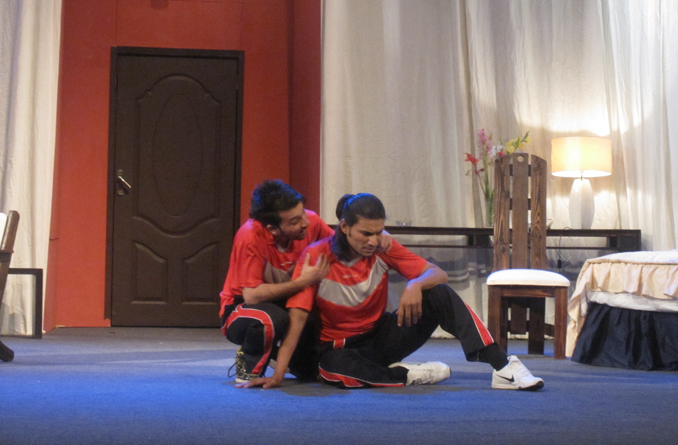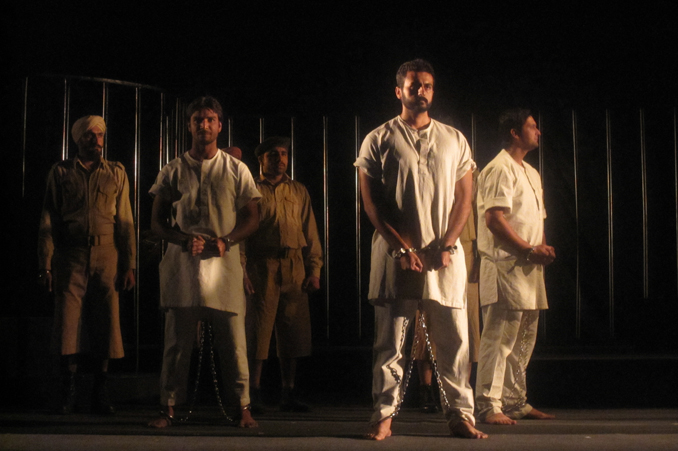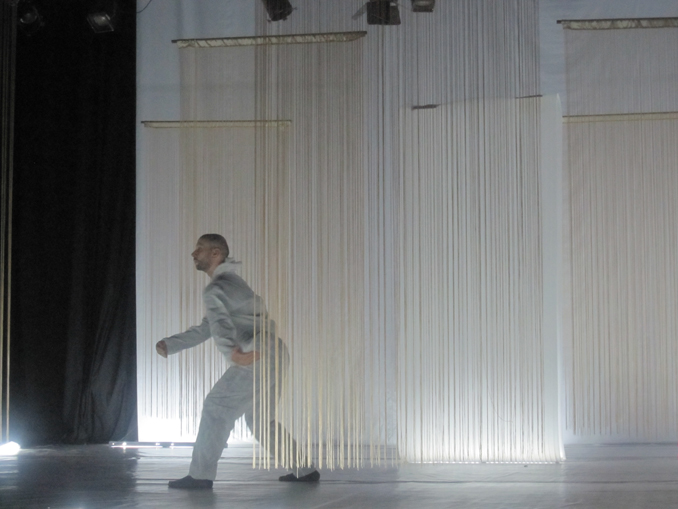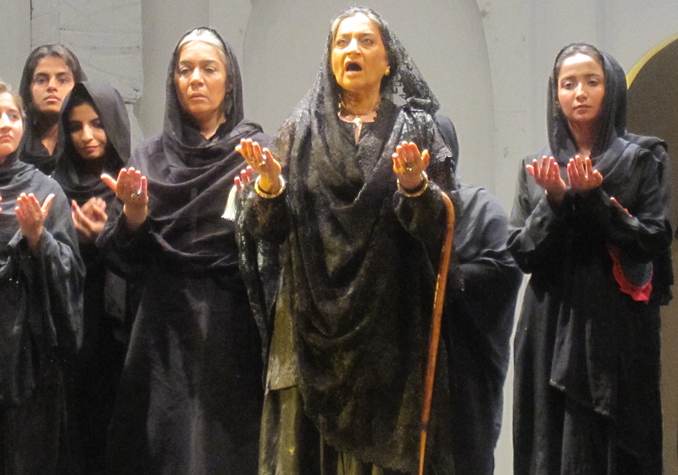Written by: Zahrah Mazhar
Posted on: March 31, 2014 | 
NAPA International Theatre Festival 2014
 |
One of the most original works, Stumped, was a poignant drama with a sense of humour. Written by Imran Yusuf and directed by Zain Ahmed, it looks into the darker side of cricket – match fixing. Sam, played by Hammad Khan, is a young, talented bowler who is shown to be the next big thing. The plot unravels how the wide-eyed boy is unknowingly sucked into the world of match fixing by team captain Chicu, played by Sunil Shanker, and the star batsman Farny, played by Rauf Afridi.
The script talks about power play in teams, fear of poverty, being controlled by the mafia and of course, the passion for cricket. While almost every actor held up their end of acting, Hammad Khan stood out for his believable and emotional portrayal of a boy who talked, slept and ate cricket but ended up losing his life to the sport.
The play is scheduled to be staged in Kolkata in April and hopefully will score with the audience in India as well.
Theatre group Ajoka is known for their musical, colourful and elaborate plays and Rang de Basanti was no exception. The play, all in Punjabi, tells the story of Bhagat Singh and his two comrades through the old Bhoga, played by Basharat Saleem, who, when a young man (played by Bilal Mughal), meets the freedom fighters in prison. Through the Bhoga’s eyes, the audience comes to know Singh, played by Nirvan Nadeem, and how he refused to plead for his life.
 |
What was most appealing was the upbeat nature of the play for even when Singh and his men are hanged to death, there is no mourning but only the resonating sound of Sarfaroshi ki Tamana.
There was dhamal, dhol, songs between acts and even a solo bhangra performance by Nirvan Nadeem – everything that the audience expected from Ajoka. As members of one of the oldest theatre groups of Pakistan, the cast and crew knew how to put on a show and turn a history lesson into a celebration of Singh’s life - not to mention they also proved their bhangra skills in the curtain call!
Ajoka also performed Lo Phir Basant Ayee at the festival.
Eksod by Brigel Gjoka was the only play in the festival which had no dialogues, apart from a few words spoken in Albanian in its beginning. It was purely dance and movement.
 |
Based on the Albanian move ‘Rrethi i Kujteses’, it ‘talks’ about submission to the regime. During the 45-minute play, dancers Gjoka and Mattia Gandini appear to be entangled in some sort of a struggle. In almost a puppet-like manner, when one would change audio variations on a device on stage, the other would synchronise his movements accordingly.
In the absence of verbal interaction, the play relied on the use of lighting, video projections, electronic music and contemporary choreography. As is the case with such pieces, Eksod was open to interpretation and the audience were left to decipher it on their own.
Three hours is far too long a time period for a play. It can take the fun out of the acting, make the memorable scenes seem forgettable and make it hard to keep track of the core subject. Raddi Bazzar, however, was marred by none of the problems.
Could the play have been staged under two hours? Yes. But did the Saltlake Mohnitharan group from India manage to keep the audience engaged for three hours and earn a standing ovation? Yes. Combining Badal Sircar’s Baaki Itihas and Pagla Ghoda, director Santanu Bose selected eight actors – including fresh graduates from New Delhi’s renowned National School of Drama - who did justice to their roles and kept the audience from looking at their watches frequently.
The play begins with four men carrying the body of a dead woman who comes to life as Malti, played by Amita Sharma, and later as Mili, Lakshmi and Ladki. Sharma’s superb acting is matched by her counterpart Gurinder Kumar. The dialogues and body language which made up the heated interaction between the pair as different characters, were executed wonderfully, giving a strong sense of reality.
The second story, Baaki Itihas, is about a married couple who, while covertly dealing with the loss of their unborn child, try to come up with a plot for a screenplay. While doing so, the husband Sharadh, played by Sunil Soni, comes across news of Sitanath’s suicide which leads the wife Vasanti, played by Mangala Kaduba, to write a script on the death. At this point, the director shifts the focus to Sitanath, played by Ashok Kumar, and his wife Kanak, played by Lapdiang Artimai.
The three story lines are put together in pieces, not coming together till the very end when all the main characters are seen on stage talking loudly to themselves and then each other. The duration of the play might have been bothersome but given the strong and real acting skills, especially of Ashok Kumar, none of the audience could say that they didn’t get their time’s worth.
There is something to be said about the simplicity of traditional theatre. Without the aid of extravagant sets, theatrical stunts or use of symbolism, actors convey a straightforward message by doing what they do the best – acting. Tehreek-e-Niswan’s play, Birjees Qadar ka Kunba, was a testament to the appeal of conventional theatre.
 |
Based on the Urdu adaptation of Garcia Lorca’s play, The House of Bernarda Alba, the play begins with two servants, Hasan Bandi and Bandi, grumbling about the tyranny of the lady of the house, Birjees Qadar. Hasan Bandi, played by Shama Askari, is the housekeeper who, despite her problems with Birjees, has been with the family for decades. The plot opens with the death of Birjees’ husband and progresses with how the dominating woman controls her five daughters.
Birjees, played by Sheema Kermani, forbids them from mingling with anyone by stepping out of the house, making it clear that talking to men, let alone befriending them, is off limits. The daughters struggle with a life of oppression and when three of them fall for the same man, all hell breaks loose.
Sheema Kermani was in her element as the domineering matriarch but her talent was matched by Shama Askari as well as the actresses who played Birjees’ daughters.
Apart from the 8 pm plays every night, dramatic readings as well as plays and stories for children kept the festival’s afternoons busy. The festival, which came to an end with the play, Raagni, by NAPA graduate Fawad Khan, was the last of the festival season in Karachi but among the top ones that the city is looking forward to next year.
You may also like: